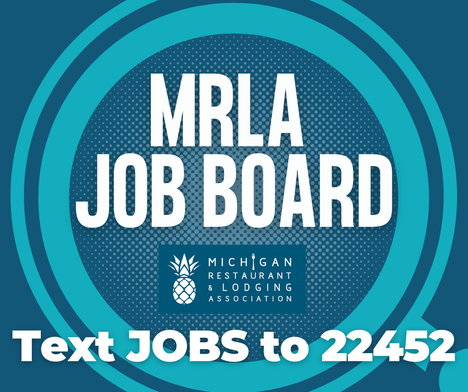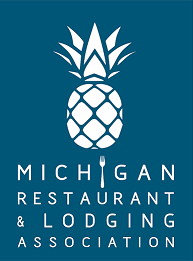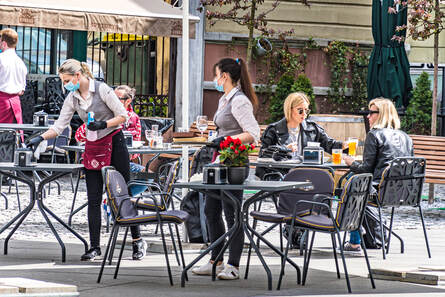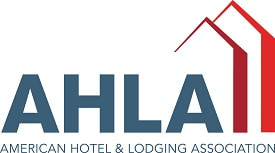Sustainable Solutions in the Race to Save the Workforce
By: Katie Frankhart

Digital solutions for human workforce challenges
In the age of technology, Midland-based tech company developed the world’s first intelligent automated real-time operational solution and virtual restaurant assistant as a cutting edge solution to the workforce challenges. Officially launching its beta partnership program in the fall, BYOD™ (Bring Your Own Data) combines advanced analytics with deep learning and IoT technologies to measure restaurant performance and provide personalized, real-time actionable steps to reduce costs and support consistent operation, allowing operators to do more with less staff.
“We understand that there is an extremely shallow employee pool right now and trained hospitality staff is at a huge premium,” says BYOD™ brand manager Dave Graham. “The platform uses A.I. and machine learning to detect patterns and identify opportunities to save time and money in real-time. It acts as a support and operational assistant while managers are on duty, providing Smart Alerts that give inexperienced managers the tools and insights that typically only more experienced managers would be able to use.”
BYOD™ employs a multi-pronged strategy for engaging and retaining staff. First, it streamlines restaurant duties up and down the chain of command, creating clear directions and accountability. Second, it takes tasks off managers plates so they can spend more time supporting, training, and engaging their staff. Third, BYOD™ lets operators and staff know exactly how their employees are performing and exactly where improvement is needed in real time with AI-driven Smart Alerts and gamified reporting that speak to the younger generations, allowing employees to see the value they create and gives them clear, easy-to-understand goals.
Graham says BYOD™ will change the conversation regarding data, its value, and how to use it as a solution. He believes the platform is poised to completely transform the way operators do business — faster and in a shorter period of time than any other hospitality industry innovation before. “Real-time actionable insights from all the connected sources delivered to the operators and management will preserve profit, quality, and the guest experience without compromise,” he says, recognizing that this is what the industry needs both now and in the long term.
As an endorsed partner, MRLA is offering members exclusive initial access and long term pricing discounts to implement the AI system via the beta partnership program. If you’re interested in participating in the BYOD™ Beta Partnership Program, email [email protected] to get signed up and onboarded.
In the age of technology, Midland-based tech company developed the world’s first intelligent automated real-time operational solution and virtual restaurant assistant as a cutting edge solution to the workforce challenges. Officially launching its beta partnership program in the fall, BYOD™ (Bring Your Own Data) combines advanced analytics with deep learning and IoT technologies to measure restaurant performance and provide personalized, real-time actionable steps to reduce costs and support consistent operation, allowing operators to do more with less staff.
“We understand that there is an extremely shallow employee pool right now and trained hospitality staff is at a huge premium,” says BYOD™ brand manager Dave Graham. “The platform uses A.I. and machine learning to detect patterns and identify opportunities to save time and money in real-time. It acts as a support and operational assistant while managers are on duty, providing Smart Alerts that give inexperienced managers the tools and insights that typically only more experienced managers would be able to use.”
BYOD™ employs a multi-pronged strategy for engaging and retaining staff. First, it streamlines restaurant duties up and down the chain of command, creating clear directions and accountability. Second, it takes tasks off managers plates so they can spend more time supporting, training, and engaging their staff. Third, BYOD™ lets operators and staff know exactly how their employees are performing and exactly where improvement is needed in real time with AI-driven Smart Alerts and gamified reporting that speak to the younger generations, allowing employees to see the value they create and gives them clear, easy-to-understand goals.
Graham says BYOD™ will change the conversation regarding data, its value, and how to use it as a solution. He believes the platform is poised to completely transform the way operators do business — faster and in a shorter period of time than any other hospitality industry innovation before. “Real-time actionable insights from all the connected sources delivered to the operators and management will preserve profit, quality, and the guest experience without compromise,” he says, recognizing that this is what the industry needs both now and in the long term.
As an endorsed partner, MRLA is offering members exclusive initial access and long term pricing discounts to implement the AI system via the beta partnership program. If you’re interested in participating in the BYOD™ Beta Partnership Program, email [email protected] to get signed up and onboarded.

Utilizing federal support for new opportunities
In July, the MRLA announced that it is partnering with the National Restaurant Association Educational Foundation (NRAEF) to bring the HOPES (Hospitality Opportunities for People (re)Entering Society) program to communities across Michigan as part of a $4 million federal grant awarded to four states. The job skills program that trains and prepares justice-involved individuals for jobs and careers in the restaurant, foodservice and hospitality industries with the ultimate goal of increasing employment opportunities and reducing recidivism.
The MRLA Educational Foundation is awarding funds to Michigan businesses participating in this national program, recognizing it as a way to support communities while helping businesses hire and re-staff. Funds are designated to cover training costs.
Through a collaborative model, HOPES partners with community-based organizations, Departments of Correction and state restaurant associations to offer the skills training, mentoring and job placement services these individuals need at the end of their incarceration to re-enter society and start building a pathway to independence. Participants are required to complete the training and achieve at least one industry credential to successfully graduate from the program. Once training is complete, they are placed in a local restaurant or foodservice position and receive follow-up support for one year with the bonus opportunity of applying for apprenticeships.
The hope for HOPES? Putting the industry back on its feet by opening doors of opportunity for people trying to get their lives back on track.
“The hospitality industry is known for being a first job opportunity and offering second chances to people from all backgrounds,” said Amanda Smith, executive director of the MRLA Educational Foundation. “With more than 30,000 industry job openings currently in Michigan, the HOPES program providing training and employment opportunities to justice involved individuals is a viable way to support communities while helping operators hire.”
Michigan operators looking to get involved with the HOPES program should contact Amanda Smith by email. She says the hospitality industry is ready to welcome all the justice involved individuals who have completed the training and is eager to provide them a pathway to viable careers.
Beyond grant funds, federal aid and new opportunities also come in the form of tax breaks for some Michigan business owners. The Work Opportunity Tax Credit (WOTC) gives a tax break to owners for hiring unemployed individuals from target groups who face significant barriers to employment, including those unemployed for 27 weeks or longer. Employers claim about $1 billion in tax credits each year under the WOTC program, yet many remain unaware of the credit — a hidden gem that can help offset the cost of turnover and cover recruitment incentives, like hiring bonuses.
There’s no limit on these tax credits — business owners can receive one for each eligible hire. You can earn a maximum credit of $2,400 for each employee on long-term unemployment at the time of hire, and the WOTC offers perks for retaining employees, too: you can earn a credit equal to 25% of the employee’s wages if they work at least 120 hours in the first year and 40% if they work at least 400 hours, up to the $2,400 cap.
For more information on the WOTC and instructions on how to apply, visit the IRS website.
In July, the MRLA announced that it is partnering with the National Restaurant Association Educational Foundation (NRAEF) to bring the HOPES (Hospitality Opportunities for People (re)Entering Society) program to communities across Michigan as part of a $4 million federal grant awarded to four states. The job skills program that trains and prepares justice-involved individuals for jobs and careers in the restaurant, foodservice and hospitality industries with the ultimate goal of increasing employment opportunities and reducing recidivism.
The MRLA Educational Foundation is awarding funds to Michigan businesses participating in this national program, recognizing it as a way to support communities while helping businesses hire and re-staff. Funds are designated to cover training costs.
Through a collaborative model, HOPES partners with community-based organizations, Departments of Correction and state restaurant associations to offer the skills training, mentoring and job placement services these individuals need at the end of their incarceration to re-enter society and start building a pathway to independence. Participants are required to complete the training and achieve at least one industry credential to successfully graduate from the program. Once training is complete, they are placed in a local restaurant or foodservice position and receive follow-up support for one year with the bonus opportunity of applying for apprenticeships.
The hope for HOPES? Putting the industry back on its feet by opening doors of opportunity for people trying to get their lives back on track.
“The hospitality industry is known for being a first job opportunity and offering second chances to people from all backgrounds,” said Amanda Smith, executive director of the MRLA Educational Foundation. “With more than 30,000 industry job openings currently in Michigan, the HOPES program providing training and employment opportunities to justice involved individuals is a viable way to support communities while helping operators hire.”
Michigan operators looking to get involved with the HOPES program should contact Amanda Smith by email. She says the hospitality industry is ready to welcome all the justice involved individuals who have completed the training and is eager to provide them a pathway to viable careers.
Beyond grant funds, federal aid and new opportunities also come in the form of tax breaks for some Michigan business owners. The Work Opportunity Tax Credit (WOTC) gives a tax break to owners for hiring unemployed individuals from target groups who face significant barriers to employment, including those unemployed for 27 weeks or longer. Employers claim about $1 billion in tax credits each year under the WOTC program, yet many remain unaware of the credit — a hidden gem that can help offset the cost of turnover and cover recruitment incentives, like hiring bonuses.
There’s no limit on these tax credits — business owners can receive one for each eligible hire. You can earn a maximum credit of $2,400 for each employee on long-term unemployment at the time of hire, and the WOTC offers perks for retaining employees, too: you can earn a credit equal to 25% of the employee’s wages if they work at least 120 hours in the first year and 40% if they work at least 400 hours, up to the $2,400 cap.
For more information on the WOTC and instructions on how to apply, visit the IRS website.

Resources and support, directly from the MRLA
Despite Michigan being restriction-free with an abundance of safe and effective vaccines, restaurateurs and hoteliers are unable to fill the innumerable openings at wages rising at twice the rate of any other industry. In June, MRLA leaders signed onto a letter and supported the legislature passing a bill to remove the $300 extra unemployment now that the state is fully open and vaccines widely available. These advocacy efforts are only just part of the support MRLA offers members and business owners as the association kept members and operators industry-wide in the know for the last year and a half.
“The way the MRLA stepped up during the pandemic cannot be stressed enough,” Cathy Pulverent says of the efforts made by the association. “Without their constant updates and emails, I may not have had the heads up on the resources that kept our doors open.”
In response to the workforce shortage, the MRLA created specific resources to support Michigan hospitality business owners and industry workers like the MRLA Job Board and Value Services that can be used to offer unique benefits to employees. The MRLA launched its hospitality industry-specific job board that gives the public free and immediate access to industry job openings, updated each day by business owners and operators across the state. Members have free access to post openings to the site and non-members can post for a small fee.
The job board is designed to streamline the application process, allowing individuals to build a profile, update their resume, apply quickly and easily, and subscribe via email and text for career updates and new posting alerts. The MRLA is also launching a marketing campaign around the job board to entice people to join the industry, highlighting all of the great components that come with working in this industry.
In Mackinac Island, it’s hard to find seasonal workers, but Liz Ware of Mission Point Resort believes the MRLA Job Board is a small remedy to that. “Representing the industry, the MRLA Job Board will soon become the ‘go-to’ place for workers to find any sort of hospitality position around the state,” she says.
For owners, operators, and staff alike, services and resources provided by the MRLA are changing the way we approach the rebuilding of an entire workforce and the renewal of an entire industry’s reputation.
“Hospitality supports more than its onsite workers, there are the accountants, architects, dry cleaners, farmers and more, and we need a collective voice supporting organizations and industries,” says Ware. “This is why the MRLA is so important, they’re offering resources and building certification programs within the industry that will lead to a greater sense of pride in staff.”
Despite Michigan being restriction-free with an abundance of safe and effective vaccines, restaurateurs and hoteliers are unable to fill the innumerable openings at wages rising at twice the rate of any other industry. In June, MRLA leaders signed onto a letter and supported the legislature passing a bill to remove the $300 extra unemployment now that the state is fully open and vaccines widely available. These advocacy efforts are only just part of the support MRLA offers members and business owners as the association kept members and operators industry-wide in the know for the last year and a half.
“The way the MRLA stepped up during the pandemic cannot be stressed enough,” Cathy Pulverent says of the efforts made by the association. “Without their constant updates and emails, I may not have had the heads up on the resources that kept our doors open.”
In response to the workforce shortage, the MRLA created specific resources to support Michigan hospitality business owners and industry workers like the MRLA Job Board and Value Services that can be used to offer unique benefits to employees. The MRLA launched its hospitality industry-specific job board that gives the public free and immediate access to industry job openings, updated each day by business owners and operators across the state. Members have free access to post openings to the site and non-members can post for a small fee.
The job board is designed to streamline the application process, allowing individuals to build a profile, update their resume, apply quickly and easily, and subscribe via email and text for career updates and new posting alerts. The MRLA is also launching a marketing campaign around the job board to entice people to join the industry, highlighting all of the great components that come with working in this industry.
In Mackinac Island, it’s hard to find seasonal workers, but Liz Ware of Mission Point Resort believes the MRLA Job Board is a small remedy to that. “Representing the industry, the MRLA Job Board will soon become the ‘go-to’ place for workers to find any sort of hospitality position around the state,” she says.
For owners, operators, and staff alike, services and resources provided by the MRLA are changing the way we approach the rebuilding of an entire workforce and the renewal of an entire industry’s reputation.
“Hospitality supports more than its onsite workers, there are the accountants, architects, dry cleaners, farmers and more, and we need a collective voice supporting organizations and industries,” says Ware. “This is why the MRLA is so important, they’re offering resources and building certification programs within the industry that will lead to a greater sense of pride in staff.”







